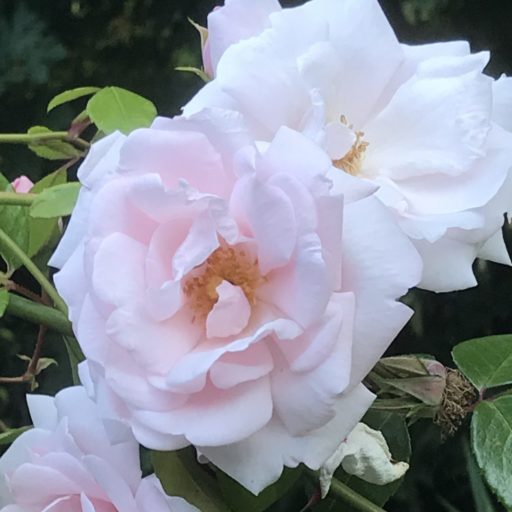A lovely day today, bright sun, light breezes, a few clouds here and there. The grass is that lovely spring green that just seems to glow even in the shade. The chestnut leaves are popping out now, and the golden-yellow kerria flowers look so pretty against them.
Both lilacs are blooming now, though the deep reddish one is a little behind. I cut it back severely this winter, so we could see some structure, but of course that also took out easily half it’s bloom for this season. That’s okay– it looks lovely, and will have loads next year!
Here in the garden, it is peaceful and lovely. But I know that this small circle of calm is deceptive. So many things are going on in the world — difficult, terrible, sad things. Usually I let T blog about the bigger picture, but today I feel I want to chime in.
What place does a little garden and its keeper have when children are going hungry or being exploited? What purpose does this beauty and calm serve when far away only chaos and destruction can be seen? How does planting a flower seed help a child learn to read? How does rearranging benches and pots help a mother feed her children? How does carefully watering a tender plant heal the wounds left by countless generations of hate?
Is it possible that mindfully tending this small spot — admiring its resilience and adaptability, cherishing its personalities and moods, attuning to its needs and the lessons it teaches — provides something greater? Could it be that it is this sort of action which allows for HOPE to remain in the world?
Certainly it is a hopeful act, in and of itself. It is the hope of the new day, the changing seasons, the growth inherent in Life itself.
Does it also provide some hope to others though? People in far-away lands?
Maybe their dreams sometimes stop by my garden and rest in the shade of the elderberry trees?
Possibly the scent of the flowers touches the birds and butterflies, who carry it on to those in the cities.
I would like to think that the ordinary actions of one simple woman in a small garden somehow improves the world, not just immediately for my children, but in an ever-widening strengthening of the core of existence. By resolutely going about my business, perhaps I model a “normal” for those who have none. Can I reconcile my relatively easy life with theirs? I don’t know.
I don’t think anything would be gained by abandoning the obligations I have here and now; I don’t think people on the other side of the world would be helped if I suddenly uprooted my life and family and joined those who have little.
Dare I imagine the day when the women in Darfur, in Sri Lanka, in Harbin, in Punta del Este, in Sibiu, share with me the simple pleasure of watching our gardens and our children flourish?
I do imagine it! And I hope others can, too.
